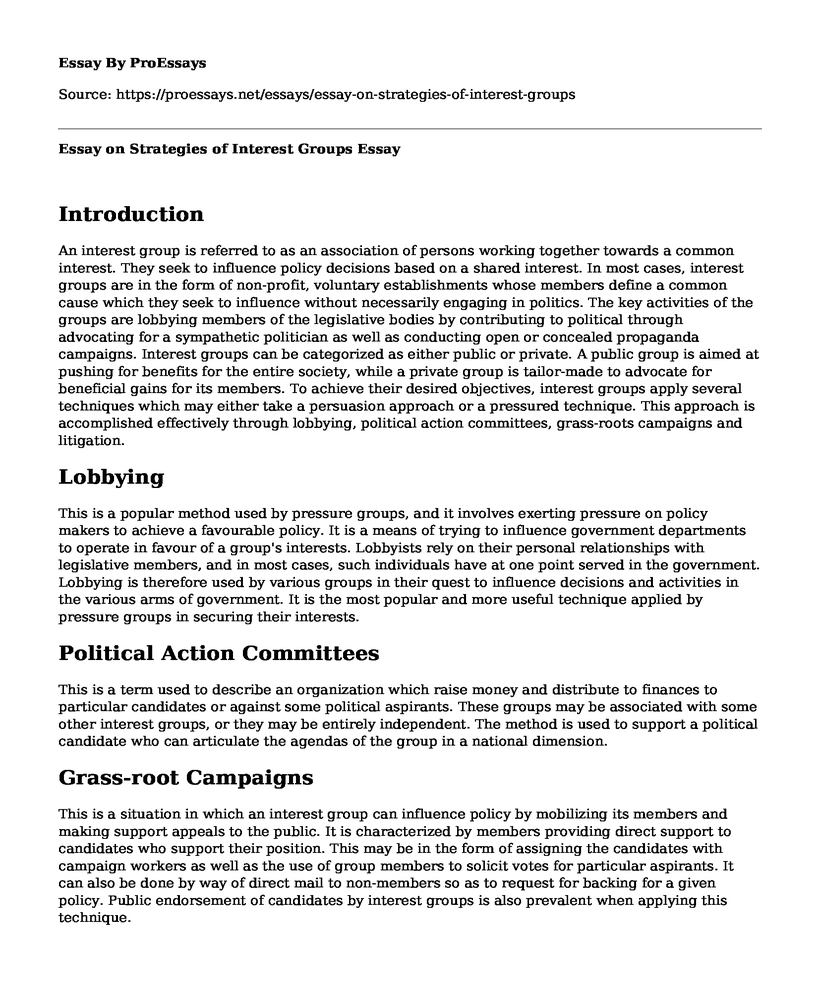Introduction
An interest group is referred to as an association of persons working together towards a common interest. They seek to influence policy decisions based on a shared interest. In most cases, interest groups are in the form of non-profit, voluntary establishments whose members define a common cause which they seek to influence without necessarily engaging in politics. The key activities of the groups are lobbying members of the legislative bodies by contributing to political through advocating for a sympathetic politician as well as conducting open or concealed propaganda campaigns. Interest groups can be categorized as either public or private. A public group is aimed at pushing for benefits for the entire society, while a private group is tailor-made to advocate for beneficial gains for its members. To achieve their desired objectives, interest groups apply several techniques which may either take a persuasion approach or a pressured technique. This approach is accomplished effectively through lobbying, political action committees, grass-roots campaigns and litigation.
Lobbying
This is a popular method used by pressure groups, and it involves exerting pressure on policy makers to achieve a favourable policy. It is a means of trying to influence government departments to operate in favour of a group's interests. Lobbyists rely on their personal relationships with legislative members, and in most cases, such individuals have at one point served in the government. Lobbying is therefore used by various groups in their quest to influence decisions and activities in the various arms of government. It is the most popular and more useful technique applied by pressure groups in securing their interests.
Political Action Committees
This is a term used to describe an organization which raise money and distribute to finances to particular candidates or against some political aspirants. These groups may be associated with some other interest groups, or they may be entirely independent. The method is used to support a political candidate who can articulate the agendas of the group in a national dimension.
Grass-root Campaigns
This is a situation in which an interest group can influence policy by mobilizing its members and making support appeals to the public. It is characterized by members providing direct support to candidates who support their position. This may be in the form of assigning the candidates with campaign workers as well as the use of group members to solicit votes for particular aspirants. It can also be done by way of direct mail to non-members so as to request for backing for a given policy. Public endorsement of candidates by interest groups is also prevalent when applying this technique.
Litigation
If the legislative and the executive branches of the government do not address the concerns raised by an interest group, a court redress may be sought to remedy the situation. It is a method used by interest groups to sue the government organs or groups they oppose. However, this process is affected by the complexity of litigation.
Conclusion
In conclusion, interest groups are viewed as a panacea of hope to individual members of groups and the society as a whole. This is because it would be technically impossible for one person to push for policy changes and overhauls at a personal level. Thus interest groups provide the best chance in furthering good practices and mitigation of oppressive policies.
Work Cited
Malcolm, Jeremy. Access to Knowledge for Consumers: Reports of Campaigns and Research 2008-2010. Kuala Lumpur: Consumers International, 2010. Internet resource.
Duignan, Brian. Political Parties, Interest Groups, and Elections (e-Book). New York: Rosen Digital, n.d.. Print.
Zetter, Lionel. Lobbying: The Art of Political Persuasion. Petersfield, Hampshire: Harriman House, 2011. Print.
Cite this page
Essay on Strategies of Interest Groups. (2022, May 16). Retrieved from https://proessays.net/essays/essay-on-strategies-of-interest-groups
If you are the original author of this essay and no longer wish to have it published on the ProEssays website, please click below to request its removal:
- Paper Sample on Importance of Organizational Change and Employees Engagement
- Sustainable Development In Relation to Procurement, Essay Example
- Self-Reflection and Evaluation: "Bring the Concept to Life" Project
- Risks Associated With Information Technology Projects Management
- Leadership in the Mid-20th Century: Quantum Theory - Essay Sample
- Report Sample on Robin Hood & Band Of Merry Men: Challenges & Solutions
- Making Decisions with Data: Understanding Hypothesis Testing & Statistical Significance - Article Review Example







